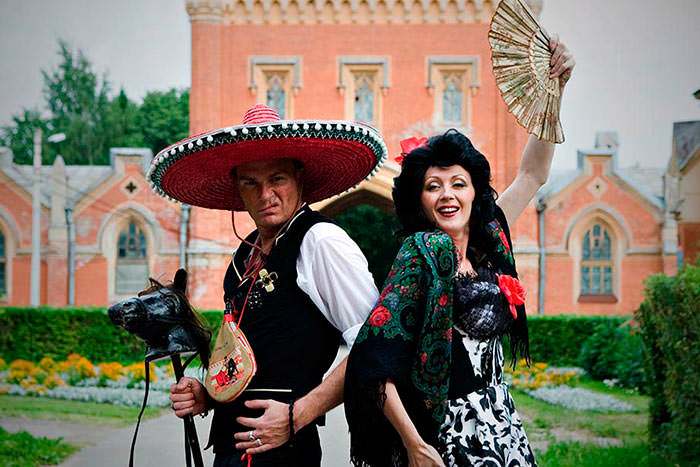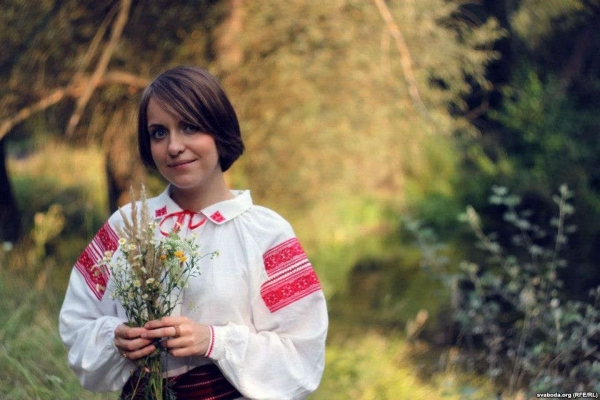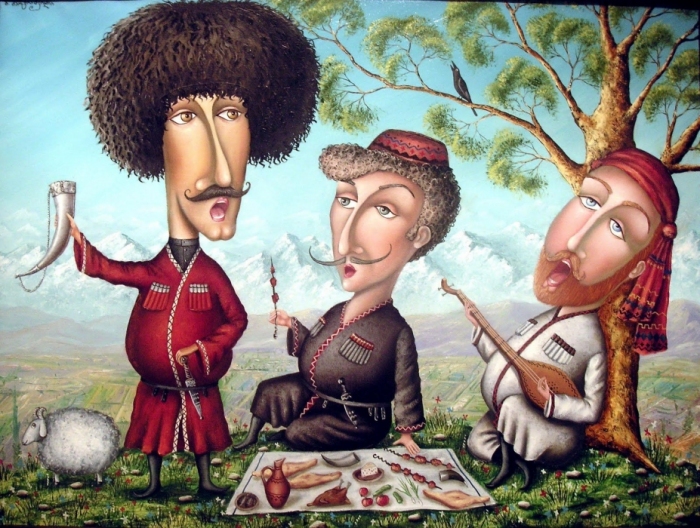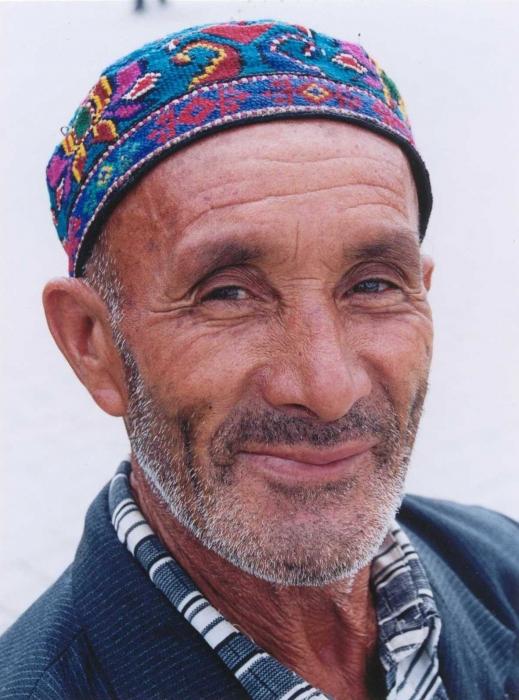417
To figure out what nationality this or that surname belongs to, you need to pay attention to suffixes and endings.
So, the most common suffix Ukrainian surnames- “-enko” (Bondarenko, Petrenko, Timoshenko, Ostapenko). Another group of suffixes is “-eyko”, “-ko”, “-point” (Belebeiko, Bobreiko, Grishko). The third suffix is “-ovsky” (Berezovsky, Mogilevsky). Often among Ukrainian surnames one can find those that come from the names of professions (Koval, Gonchar), as well as from combinations of two words (Sinegub, Belogor).
Among Russian surnames the following suffixes are common: “-an”, “-yn”, -“in”, “-skikh”, “-ov”, “-ev”, “-skoy”, “-tskoy”, “-ih”, “ th”. It is easy to guess that the following can be considered examples of such surnames: Smirnov, Nikolaev, Donskoy, Sedykh.
Polish surnames most often they have the suffixes “-sk” and “-ck”, as well as the endings “-y”, “-aya” (Sushitsky, Kovalskaya, Vishnevsky). You can often meet Poles with surnames with an unchangeable form (Sienkiewicz, Wozniak, Mickiewicz).
English surnames often come from the name of the area where the person lives (Scott, Wales), from the names of professions (Smith - blacksmith), from characteristics (Armstrong - strong, Sweet - sweet).
Before many French surnames there is an insert “Le”, “Mont” or “De” (Le Germain, Le Pen).
German surnames most often formed from names (Peters, Jacobi, Vernet), from characteristics (Klein - small), from the type of activity (Schmidt - blacksmith, Muller - miller).
Tatar surnames come from Tatar words and such suffixes: “-ov”, “-ev”, “-in” (Yuldashin, Safin).
Italian surnames are formed using the following suffixes: “-ini”, “-ino”, “-ello”, “-illo”, “-etti”, “-etto”, “-ito” (Moretti, Benedetto).
Majority Spanish and Portuguese surnames come from characteristics (Alegre - joyful, Bravo - brave). Among the endings most often found: “-ez”, “-es”, “-az” (Gomez, Lopez).

Norwegian surnames are formed using the suffix “en” (Larsen, Hansen). Surnames without a suffix (Per, Morgen) are also popular. Surnames are often formed from the name natural phenomena or animals (Blizzard - blizzard, Svane - swan).
Swedish surnames most often end in “-sson”, “-berg”, “-steady”, “-strom” (Forsberg, Bosstrom).
Estonians by last name you will not be able to tell whether a person is male or female (Simson, Nahk).
Jewish surnames there are two common roots - Levy and Cohen. Most surnames are formed from male names (Solomon, Samuel). There are also surnames that are formed with the help of suffixes (Abramson, Jacobson).
Belarusian surnames end in “-ich”, “-chik”, “-ka”, “-ko”, “-onak”, “-yonak”, “-uk”, -ik”, “-ski” (Radkevich, Kukharchik ).

Turkish surnames have the ending “-oglu”, “-ji”, “-zade” (Mustafaoglu, Ekindzhi).
Almost all Bulgarian surnames formed from names with the help of suffixes “-ov”, “-ev” (Konstantinov, Georgiev).
Men's Latvian surnames end in “-s”, “-is”, and female - in “-e”, “-a” (Shurins - Brother-in-law).
And men's Lithuanian surnames end with “-onis”, “-unas”, “-utis”, “-aitis”, “-ena” (Norvidaitis). Feminine ones end in “-en”, “-yuven”, “-uven” (Grinuven). The surnames of unmarried girls contain a part of the father's surname and the suffixes "-ut", "-polyut", "-ayt", as well as the ending "-e" (Orbakas - Orbakaite).
4 6 491 0
We meet new people almost every day. Among them may be not only compatriots, but also people of other nationalities. Knowing what roots a person belongs to is quite important if you plan to establish good contact with him. Then we can learn the characteristics of his culture and, as a result, behave decently.
The easiest and most common way to find out nationality is to parse the last name. To do this, you need to remember the school, where in the lessons they disassembled words into parts: root, prefix, suffix, etc. These skills will come in handy.
Analysis
- Take a blank piece of paper and a pen.
- Write a surname on it and disassemble the word into parts, that is, select the root, suffix, ending. It is suffixes that will be useful to us in the analysis, so select them as accurately as possible.
A suffix is the part of a word between the root and the ending.

Slavic
- Russians. Suffixes: -ih, -ih, -tskoi, -skoy, -ev, -ov, -yn, -in. For example, Voronin, Ivanov, Zolotarev.
- Ukrainian. Suffixes: -yuk, -uk, -ko, -enko. For example, Galchenko, Davidyuk, Grishko. Also, Ukrainian surnames include those that indicate the occupation (Gonchar, Bondar), individual surnames (Ukrainian, Gorobets), the combination of words (Bilous \u003d White + Mustache).
- Belarusian. Suffixes: -enak, -ich, -ok, -onak, -chik, -ka. These are such surnames as Dubrovich, Milchik, Parshonok, Tsyushka.
- Polish. Suffixes: -sk, -ck. Endings: - th, th. For example, Volnitsky, Kovalskaya. There are also double surnames if the wife wanted to leave her maiden name. So it turns out the combination of the names of the husband and wife. For example, Bilyk-Kovalska. There are among Polish surnames with an invariable form, for example, Nowak.
- Bulgarian. Suffixes: -ov, -ev. They are formed from names (Konstantinov).
- Czech. They are distinguished by the presence of -ova in female surnames, even when they sound absurd. For example, Ivanova.

European
- French. Often there is a prefix De or Le before the surnames. There is also a formation from ordinary names and nicknames that were given to a person because of the characteristics of his character or appearance.
- English. Surnames are a translation of words that indicate the place of residence, character traits or profession. For example, Sweet (sweet), Clerk (civil servant).
- German. Same as in english surnames. For example, Krause (curly), Muller (miller).
- Swedish. Endings: - strom, - sson, - stead, - berg. For example, Andersson.
- Italian. Suffixes: -ito, -ino, -etto, -ini, -etti, -illo, -ello. For example, Benedini, Morello, Esposello. In addition to suffixes, they can have specific endings, such as -i, -o, -a (Trovato). Surnames could also be given from the name of the river, city. So Leonardo da Vinci got his last name from the name of the city where he was born - Vinci. And the prefix "yes" indicated this. The prefix "di" is also found. He says that the surname comes from the name of the father. For example, Aldo di Nicolò tells us that Aldo is Nicolò's son. Also, surnames could come from the occupation of the family, but this was common among the working class. Contadino, for example, translated "peasant".
- Spanish and Portuguese. The names of these countries are very similar. Suffixes: -oz, -az, -ez, -iz, -es. There are also those that are translated as a certain trait of a person.
- Bulgarian. In this country, most surnames are formed from given names. The suffix -ev or -ov is added to them. For example, George + ev = Georgiev.

Asian
- Armenian. Suffix: -yan. In Armenia, most of the surnames have this ending. For example, Avanesyan, Galustyan.
- Azerbaijani. It is based on national names, to which either the suffix -ov or -ev is added. For example, Abdullaev.
- Georgian. Endings: -shvili, -si, -dze, -li, -uri, -ni, -ava, -ia, -a, -ua. For example, Katamadze.
- Chinese and Korean. Here, nationality is easiest to determine, since the names of these countries are very specific. They consist of 1 or 2 syllables. For example, Qiao, Li.
- Japanese. They consist of two words in the national language. For example, Katayama - piece + mountain, Wada - harmony + rice field.
- Jewish. The range of these surnames is very wide and they are determined not only by specific suffixes. There are several groups here:
- the basis is the roots of Cohen and Levy. Hence - Levitan, Koganovich.
- the basis is female and male national names, to which suffixes are added: -ovich, -on, -yan, -is, -inchik, -ik. For example, Yakubovich.
- the surname can come from the appearance, character or activity of a person. So Melamed from the profession "teacher".

To figure out what nationality this or that surname belongs to, you need to pay attention to suffixes and endings. So, the most common suffix of Ukrainian surnames is “-enko” (Bondarenko, ...
To figure out what nationality this or that surname belongs to, you need to pay attention to suffixes and endings.
So, the most common suffix Ukrainian surnames- “-enko” (Bondarenko, Petrenko, Timoshenko, Ostapenko). Another group of suffixes is “-eyko”, “-ko”, “-point” (Belebeiko, Bobreiko, Grishko). The third suffix is “-ovsky” (Berezovsky, Mogilevsky). Often among Ukrainian surnames one can find those that come from the names of professions (Koval, Gonchar), as well as from combinations of two words (Sinegub, Belogor).
Among Russian surnames the following suffixes are common: “-an”, “-yn”, -“in”, “-skikh”, “-ov”, “-ev”, “-skoy”, “-tskoy”, “-ih”, “ th”. It is easy to guess that the following can be considered examples of such surnames: Smirnov, Nikolaev, Donskoy, Sedykh.
Polish surnames most often they have the suffixes “-sk” and “-ck”, as well as the endings “-y”, “-aya” (Sushitsky, Kovalskaya, Vishnevsky). You can often meet Poles with surnames with an unchangeable form (Sienkiewicz, Wozniak, Mickiewicz).
English surnames often come from the name of the area where the person lives (Scott, Wales), from the names of professions (Smith - blacksmith), from characteristics (Armstrong - strong, Sweet - sweet).
Before many French surnames there is an insert “Le”, “Mont” or “De” (Le Germain, Le Pen).
German surnames most often formed from names (Peters, Jacobi, Vernet), from characteristics (Klein - small), from the type of activity (Schmidt - blacksmith, Muller - miller).
Tatar surnames come from Tatar words and such suffixes: “-ov”, “-ev”, “-in” (Yuldashin, Safin).
Italian surnames are formed using the following suffixes: “-ini”, “-ino”, “-ello”, “-illo”, “-etti”, “-etto”, “-ito” (Moretti, Benedetto).
Majority Spanish and Portuguese surnames come from characteristics (Alegre - joyful, Bravo - brave). Among the endings most often found: “-ez”, “-es”, “-az” (Gomez, Lopez).
Norwegian surnames are formed using the suffix “en” (Larsen, Hansen). Surnames without a suffix (Per, Morgen) are also popular. Surnames are often formed from the names of natural phenomena or animals (Blizzard - blizzard, Svane - swan).
Swedish surnames most often end in “-sson”, “-berg”, “-steady”, “-strom” (Forsberg, Bosstrom).
Estonians by last name you will not be able to understand whether a person has a masculine or feminine gender (Simson, Nahk).
Jewish surnames there are two common roots - Levy and Cohen. Most surnames are formed from male names (Solomon, Samuel). There are also surnames that are formed with the help of suffixes (Abramson, Jacobson).
Belarusian surnames end in “-ich”, “-chik”, “-ka”, “-ko”, “-onak”, “-yonak”, “-uk”, -ik”, “-ski” (Radkevich, Kukharchik ).

Turkish surnames have the ending “-oglu”, “-ji”, “-zade” (Mustafaoglu, Ekindzhi).
Almost all Bulgarian surnames formed from names with the help of suffixes “-ov”, “-ev” (Konstantinov, Georgiev).
Men's Latvian surnames end in “-s”, “-is”, and female - in “-e”, “-a” (Shurins - Brother-in-law).
And men's Lithuanian surnames end with “-onis”, “-unas”, “-utis”, “-aitis”, “-ena” (Norvidaitis). Feminine ones end in “-en”, “-yuven”, “-uven” (Grinuven). The surnames of unmarried girls contain a part of the father's surname and the suffixes "-ut", "-polyut", "-ayt", as well as the ending "-e" (Orbakas - Orbakaite).
Majority Armenian surnames end with the suffix “-yan”, “-yants”, “-uni” (Hakopyan, Galustyan).
Georgian surnames end in “-shvili”, “-dze”, “-uri”, “-ava”, “-a”, “-ua”, “-ia”, “-ni” (Mikadze, Gvishian).

Greek surnames the endings “-idis”, “-kos”, - “pulos” (Angelopoulos, Nikolaidis) are inherent.
Chinese and Korean surnames consist of one, sometimes two syllables (Tang Liu, Qiao, Mao).
Japanese surnames are formed using one or two words (Kitamura - north and village).
Feature of women's Czech surnames is the obligatory ending “-ova” (Valdrova, Andersonova). (via)
It is amazing how many differences there are between the surnames of different nationalities and peoples!
It can be said that all people are interested in their roots, the origin of the family and its history. In connection with the global cataclysms that followed the October Revolution, many documents were lost. And now one can often find out one's origins only “philologically” - by the composition of the generic name, that is, by which surname belongs to which nation.
Suffixes in surnames
The most "speaking" part of this word is, without a doubt, the suffix. So, sounding like “ko”, “eyko”, “enko” speaks of the Ukrainian roots of the bearers of the surname, and “ovsk” or “evsk” with equal probability can indicate origin from both Ukraine and Poland. With such a suffix, it will be necessary to find out which surname belongs to which nation with the help of additional signs. These include the root of the surname, which often indicates which language was used in the creation of this particular derivative.
The number of words that form a surname
Which nation a surname belongs to can be quite accurately recognized by the number of words it consists of. For example, the bearers of the proud surname Chernokobylka are obvious Slavs, such complex generic names are typical for Poles, Russians, Belarusians and Ukrainians.
The roots “cohen”, “levi” and the suffixes “son”, “bein”, “shtam” also leave no doubt which surname belongs to which nation, they undoubtedly indicate the Jewish origin of the ancestors, at least in the post-Soviet space (in the case of particles "sleep").
Difficulties in determining the origin of the surname 
However, one should not trust linguistic research too much. On the territory of Russia there was a mixture of too many peoples, from which some echoes remained in the generic names. Which surname belongs to which nation cannot be precisely determined, except for very obvious cases - for example, with an ending in “jo”. Although here you can make a mistake: you can say with confidence that you have a descendant of Georgians in front of you, but it may well turn out that the ancestor was a Japanese, who also have such a particle in their names.
And in the old days, illiterate people or scribes with unreadable handwriting often took part in fixing surnames. So it is quite possible that the bearer of the surname Levinsky had a great-grandfather Lovitsky, who was simply incorrectly recorded.
Which nation the surname is most difficult to determine if it contains the suffixes "ov" or "in". There is a general opinion that such generic names are Russian by definition. Moreover, if it has nothing to do with the Russian language, then the family is most likely Tatar or Bashkir.

With clearly foreign surnames, it is often much easier. The surviving prefix "de" or "le" speaks of the French origin of the family, German or English roots are also easily recognizable.
The Poles were marked in the pedigrees with the suffix "chik" or "sk", the Armenians - "yan" and "nts", although the surname that ends in "uni" is also most likely Armenian.
Finding your roots
In particularly difficult cases, those who wish to establish their origin will have to painstakingly delve into foreign dictionaries to find out which language the stem (root) of their surname belongs to. At the same time, one should not forget about the diversity of nationalities on the territory of modern, and even more so, pre-revolutionary Russia. The migrations of people and the mixing of peoples and nationalities can greatly confuse the search and puzzle its results.
Having studied the surname, you can find out almost everything: belonging to the family, nationality or nationality. Although the search for the true meaning of the surname is quite a painstaking task that takes time, but it's worth it. Specialists in this case can say a lot by the name of a person, after a special analysis they will determine where it appeared and when. But belonging to a certain nationality is a hotel feature. You can divide the surname into parts (highlight the root, suffixes) and determine the origin of the surname and the territory of occurrence.
For example:
- Ukrainian surnames that can be found in the Ukrainian language. Most often, such surnames have a special suffix "enko": Bondarenko, Timoshenko, Prokopenko, Chernenko, Gradienko, Petrenko. This is the first group of Ukrainian surnames, the second group includes surnames with the suffixes "eyko", "ko", "point": Belebeyko, Butko, Sterochko, Bobreiko and the like. And the third, smallest group of surnames with the suffix "ovsky": Berezovsky, Osinovsky, Kolpakovsky, Mogilevsky, Novosky. Since many Ukrainian surnames have Slavic roots, they also contain surnames by occupation (Gonchar, Masloboy) or taken from the description of the surrounding world or animal names (Voronenko - raven). But from the English feature of the fusion of two words in a surname in the Ukrainian language, there are such examples: Sinegub, Krasnonos, Belogor, Nepiyvoda or Ryabokon.
- Jewish surnames are the second most common group of surnames. Since the peculiarity of the Jewish people is the occupation of trade, it is not surprising that their communities can be found all over the world. The Jewish people were one of the first to understand that qualities cannot be inherited and began to collect their special wealth - knowledge. There are two main roots in Jewish surnames: Levi and Cohen, they form a large group of surnames. Such roots have a sacred beginning, and among the Jews they are considered, as it were, two sources that stood at the head of the Jewish family and are transmitted only through the male line. These roots mean that the ancestors of these Jews had a high rank in the priesthood and the surnames were formed from them: Katz, Levit, Levitan, Kogan and the like. Another group of Jewish surnames is formed from male names: Solomon, Samuel, Israel. And the third group - surnames, which were formed by adding suffixes to male names: Abramson, Mosesan, Jacobson, Mendelssohn, Fishbein. Jews lived in different territories, but it is precisely by the peculiarity of the surname that its origin can be determined. And only by the suffixes in Jewish surnames can one say exactly where this or that surname came from: let's say in Poland it is "Padva". For example, in the Slavic territory, the names of Jews acquired a special Slavic pronunciation: Berkovich, Yakubovich, Davidovich or Abramovsky. Also among the Jews, when praying, a person is called by the name of his mother, nationality is also transmitted through the female line. Thanks to this attitude towards women, another group with a female root appears in Jewish surnames: Rivman, Sorinson, Beilis and others. But the Jews also have surnames indicating personal qualities or formed from the type of their activity. For example, the surname Rabin, as you might guess, comes from "rabbi."
- Tatar surnames are also widespread, because the history of Rus' is also connected with this people. Tatars are the largest ethnic group, as it happened historically, therefore, similar surnames are often found. Almost all Tatar surnames consist of the Tatar word and the original Russian suffixes "ov", "ev" and "in": Yunusev, Yuldashin, Abaidullin or Safin. This merger is explained by the interaction of two cultures over a long period of time.
- English surnames are not so common, but still sometimes found. There are several ways to form such surnames. One of them is the surname at the place of residence of the family: Scott, Irish, English, England and others. The second type of surnames is formed, like many in Russia, by occupation: Spooner, Carver. And the third group according to the qualities of a person: Bad, Good or Kind.
- French surnames prevailed in pre-revolutionary Russia. The French people have always been famous for their wit and special ingenuity in determining names, the same thing happened with surnames. To form surnames, the French use names or nicknames, to which the prefix "De" or "Le" is added.
- German surnames are not a very wide group, but still it has a place to be. Such surnames are formed from the names: Peters, Jacobi, Werner or Hartman. There may be uses not personal names, but nicknames: Klein or words taken from the profession: Schmidt.
- Polish surnames are also found in Russia, the most common of them: Nowak, Mazur or Kowalczyk.
With knowledge about national characteristics surnames you can define a group for your surname, and determine which nationality it belongs to. You should decompose your last name into components and deal with them based on the data received.



